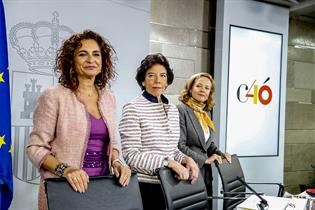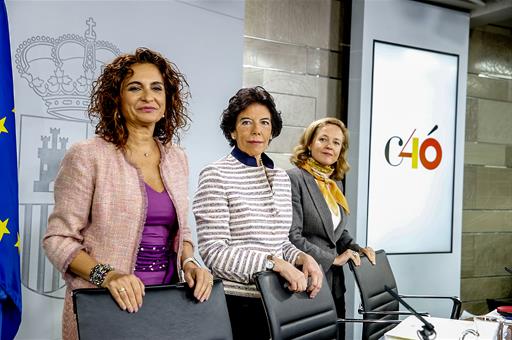Extraordinary Council of Ministers
Government forecasts GDP growth of 2.6% and a fall in deficit to 1.8% in 2019
Council of Ministers - 2018.10.15
Moncloa Palace, Madrid
The Minister for Education and Vocational Training, and Government Spokesperson, Isabel Celaá, reiterated the government's commitment to a National Budget "for a social State", following the extraordinary meeting of the Council of Ministers to tackle the Draft Budget for 2019.
Isabel Celaá explained that it was not binding to present this document to the Council of Ministers, but the government sought to "dress the Draft Budget with formality" and offer details on its content before sending it on to the European Commission the same day.
The Government Spokesperson stated that the government's goal is to reverse the cuts made, protect the most needy, maintain a competitive and emerging economy and improve democratic quality. The question, she said, is to ensure that the positive macro-economic figures for the last five years "definitively filter down to improve people's lives". Isabel Celaá underlined that the government will continue negotiating with the political forces so as to garner support for the 2019 public accounts.
Responsible and realistic Draft Budget
 Pool Moncloa/JM CuadradoThe Minister for Economy and Business, Nadia Calviño, recalled that the crisis began at this time ten years ago, "a crisis that has had a high cost in terms of the public accounts, the Welfare State, inequality, and the quality of life of a good part of our society". The measures included in the Draft Budget, she pointed out, represent "a turning point" in this regard, since they show that it is possible to combine fiscal discipline with the fight against inequality.
Pool Moncloa/JM CuadradoThe Minister for Economy and Business, Nadia Calviño, recalled that the crisis began at this time ten years ago, "a crisis that has had a high cost in terms of the public accounts, the Welfare State, inequality, and the quality of life of a good part of our society". The measures included in the Draft Budget, she pointed out, represent "a turning point" in this regard, since they show that it is possible to combine fiscal discipline with the fight against inequality.
Nadia Calviño stressed that the Draft Budget is "responsible and realistic" and meets the three fundamental objectives of the government's economic policy. Firstly, to reduce the public deficit, which will not only drop because of the buoyant economic situation, but also because of the adoption of "responsible policies" that allow for the public accounts to be "cleaned up once and for all".
Secondly, the redistributive function of fiscal policy, "with spending measures that are not only socially fair, but are also economically productive".
And thirdly, the long-term sustainability of the economy: for the first time since the year 2007, Spain will post a primary tax surplus in 2019, in other words, excluding the costs of servicing public debt, which will mean that public debt "will finally start to drop at a significant pace".
Lower unemployment and public debt
The updated macro-economic chart sent to Brussels forecasts growth in the Gross Domestic Product (GDP) of 2.6% in 2018 and of 2.3% in 2019. The Minister for Economy pointed out that these figures represent a "slight" downturn of 0.1% in each of these two years on the chart presented on 20 July, in line with "the principle of prudence" in the government's forecasts.
Spain, she explained, is going through a positive phase of the economic cycle, which hit a peak in 2015; since then, "sound" rates of growth have been posted that are higher than the European Union average but which are progressively becoming more moderate "which is absolutely in line with the maturity of the cycle" and the situation of the global economy. The GDP revision is down, above all, to less growth in the Spanish export markets, as well as a "tougher outlook" for oil prices and growth in the EU, she remarked.
 Pool Moncloa/JM CuadradoAs regards the public deficit, the government forecasts that this will drop by 0.9% in 2019 to stand at 1.8% of GDP, a target "that does not endanger either economic growth or job creation", which are "fundamental priorities". The unemployment rate expected for this year stands at 15.5%, a percentage that will fall to 13.8% in 2019. In terms of spending, Nadia Calviño highlighted the efforts in the fields of education and science, which are essential for increasing human capital and productivity.
Pool Moncloa/JM CuadradoAs regards the public deficit, the government forecasts that this will drop by 0.9% in 2019 to stand at 1.8% of GDP, a target "that does not endanger either economic growth or job creation", which are "fundamental priorities". The unemployment rate expected for this year stands at 15.5%, a percentage that will fall to 13.8% in 2019. In terms of spending, Nadia Calviño highlighted the efforts in the fields of education and science, which are essential for increasing human capital and productivity.
The reduction in the deficit to 1.8% will lead to a primary deficit of 0.5% of GDP, which will allow the public debt to fall from the 98.1% posted at the end of 2017 to 95.5% by the end of 2019. As a result of this structural adjustment, Spain will meet its European commitments: the deficit will end the year at 2.7% of GDP, below the reference figure of 3% of the "corrective arm" of the Stability and Growth Pact, which would thus lead it to be subject to the "preventive arm" of the Pact, "the goals of which will be met" with the deficit target for 2019, outlined the minister.
Recovery of social rights
The Minister for the Treasury, María Jesús Montero, insisted that the government's proposal offers a greater commitment to Brussels, since it redirects the deficit target and places it at 1.8% of GDP compared with the 1.3% forecast by the previous government. "The government has proposed a realistic path because the opposite would have meant taking away 11 billion euros in spending", which would have held back the economic recovery and job creation.
María Jesús Montero added that the Draft Budget respects "the stability commitments, recovers social rights, shields the Welfare State and incorporates greater performance, efficiency and progressiveness in the fiscal system".
Tax policy
The minister stated that the tax policy incorporated into the Draft Budget increases the contribution from those who have the most, reduces taxes on small companies and taxes new sectors of activity in line with EU recommendations. "This is a responsible tax policy where the middle and working classes will not pay more taxes, but rather the opposite".
 Pool Moncloa/JM CuadradoIn this regard, she specified that Personal Income Tax will be raised by two points for income over 130,000 euros and four points for income over 300,000 euros, and Personal Income Tax on capital that exceeds 140,000 euros will rise by four points. These two measures will generate an additional 328 million euros in tax revenue.
Pool Moncloa/JM CuadradoIn this regard, she specified that Personal Income Tax will be raised by two points for income over 130,000 euros and four points for income over 300,000 euros, and Personal Income Tax on capital that exceeds 140,000 euros will rise by four points. These two measures will generate an additional 328 million euros in tax revenue.
As regards Corporate Income Tax, this will fall by two points for SMEs that have turnover of less than 1 million euros, which will affect tax revenue collection by 1.52 billion euros. The Tax on Financial Transactions will contribute revenue of 850 million euros while the Tax on Digital Services will contribute 1.2 billion euros. Furthermore, Capital Gains Tax will be raised for those who declare assets worth more than 10 million euros, which will lead to an increase in revenue of 339 million euros.
The minister also pointed out that VAT has been dropped on feminine hygiene products and on veterinary services, which will offer a tax saving of 53 million euros. As regards environmental taxation, progress is made on bringing the prices of petrol and diesel in line with each other, pursuant to EU recommendations, which will lead to additional revenue of 670 million euros.
Fight against tax fraud
María Jesús Montero announced that in order to promote a fairer tax system, a raft of measures will be approved in the fight against tax fraud. Among others, the list of tax havens will be updated, the list of bad debtors will be extended to those who are jointly and severally liable and limits on cash payments will be established, which may not exceed 1,000 euros when one of the parties is a professional.
This raft of measures, she stated, "will form part of an Act of Parliament that will be presented shortly as a Draft Bill which will lead to increased revenue of 828 million euros".
All of these tax measures, together with the fight against fraud being promoted by the government, "will raise revenue by 5.68 billion euros", specified the minister.
María Jesús Montero recalled that the revenue from the Tax on Financial Transactions will be transferred to the Social Security system and Capital Gains Tax to the regional accounts. The total tax revenue measures that will only affect the General State Budget will amount to 4.49 billion euros in 2019. She further remarked that tax revenue will also increase, which will help strengthen the Welfare State.
Commitment to spending
 Pool Moncloa/JM CuadradoThe minister recalled that pension updates with the real CPI will increase State spending on long-term care by 40%, the minimum wage will be raised by 22.3% to stand at 900 euros, unemployment benefits will be recovered for those over the age of 52, pharmaceutical co-payments will be eliminated and paternity leave will be extended.
Pool Moncloa/JM CuadradoThe minister recalled that pension updates with the real CPI will increase State spending on long-term care by 40%, the minimum wage will be raised by 22.3% to stand at 900 euros, unemployment benefits will be recovered for those over the age of 52, pharmaceutical co-payments will be eliminated and paternity leave will be extended.
These initiatives, according to the minister, "will improve the lives of millions of citizens and will have a global economic impact on spending amounting to 5.1 billion euros". Of this total amount, the measures that will directly impact on the ceiling on spending of the government under the National Budget will amount to 2 billion euros, the rest will be expenses of the sub-sectors of the Social Security system or of the regional administrations.
Total public spending, outlined María Jesús Montero, will increase by 3.1% to 515.55 billion euros, while public revenue will rise by 5.7% to 493 billion euros. In other words, spending will rise by 3.1% while revenue will rise by 5.7%.
The ceiling on spending under the Budget for 2019 will amount to 125.06 billion euros, a 4.4% rise, with additional spending of 5.23 billion euros.
The minister asserted that the government will approve the National Budget for 2019 with the deficit path approved at the end of November or beginning of December. In this regard, she maintained that if the new deficit target for 2019 of 1.8% is still not approved then the public accounts will adopt the target of 1.3% approved by the previous government, while it will not be necessary to modify the ceiling on spending.
Non official translation





